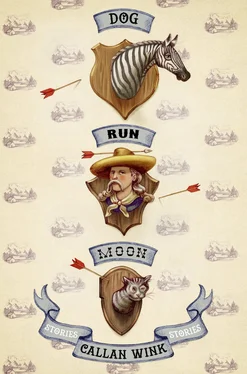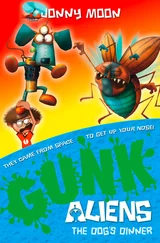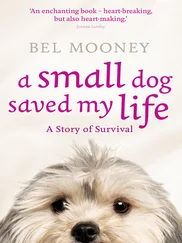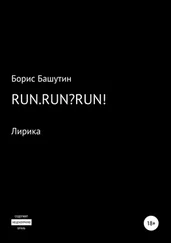She called in Elton John and fed them and put out two bowls for the cats. She heated up soup for herself and crushed half a bag of saltines into it and ate standing over the kitchen sink looking out the window into the dark, thinking alternately about her dead steer and her one-thousand-dollar tax refund. That’s how it had always gone for her, her whole life, one fortuitous turn of events followed by equal or greater amounts of heartache and tragedy. Her life was one of those electronic poker machines, rigged for the house. Feed you enough sugar to keep your hopes alive and then crush-crush-crush; a little more sugar, and then, crush some more. Elton John sat and looked at her expectantly. She put her soup bowl down and they licked it, each on separate sides, noses nearly touching. Now she wished she had just gone right down to Jason’s and confronted him first off. She would think about it all night long and wouldn’t sleep at all.
—
She and Manuel had been married for only two years. They hadn’t been particularly good years. But, during that time, her life had been occupied by another person. There was something to be said for that, even if that other person was just Manny, wheelchair bound toward the end — and mean, even at the beginning. Since Manny’s passing, she’d filled her life with the animals. She had the cattle, a miniature pony, three hogs, three Nubian goats, two peacocks, Elton John, two alpacas, several cats who existed as cats tend to do, on the periphery, and an ever-changing number of chickens.
She cared greatly for the animals, but sometimes she missed a weight on the mattress next to her at night. There were times when the sound of her cattle muttering in the yard and the snoring of Elton John wasn’t enough to make her fall asleep.
—
She did her chores in the early morning gray. It was the weekend, and she didn’t have to go to work. She was a custodian at the high school in town, a job she neither liked nor hated. It was just what she did for a set number of hours a week to feed her animals.
She tried to avoid the red mound of the steer on her front lawn but she had to scatter feed for the chickens, and as she walked by the dead animal she saw that something, a magpie probably, had pecked out an eye. The hole yawned at her. She went back inside and climbed into her bed and pulled the covers over her head.
—
Lauren had ten acres of land upon which grew not a single tree. At some distant time, it had been a riverbed, and her pasture was cobbled river rock sparsely covered with grass. When the wind blew, great swirling clouds of dust rose and sifted into her house forming deltas of grit under the doorways. There wasn’t enough forage for the cattle, so even in the summer she had to buy hay.
The land and the small house that sat upon it had been left to her by Manuel. It was half of a twenty-acre plot, the other ten acres belonged to Jason, Manuel’s son from his first marriage. Jason worked at the Stillwater mine and was gone for long periods of time. He had a trailer house on his section and a jeep up on blocks. When Lauren hadn’t seen any sign of his presence for a while, her hopes would rise slightly and she would think fondly about explosions, tunnel collapses, equipment failures, and then when eventually he returned and she saw his truck parked and that evil-looking shepherd dog stalking around in the burdock, she’d feel vaguely ill, as if he were the returning symptom of some chronic disease.
Jason begrudged her the land Manny had left to her. He and Manny, the way it often is with father and sons, had hated each other every day of their adult lives and toward the end didn’t speak for months. That much hate takes almost as much work as love and, in the end, the two might be nearly indistinguishable. With that in mind, she tried not to hate Jason. She just wished he didn’t exist.
She lay in bed until nearly noon when Elton John’s whining at the door forced her to move. She let the dogs out and watched them sniff around the dead steer. After a while, still in her flannel pajamas, she put on her boots and went to the shed. She rummaged around and found a length of chain and a flat nylon tow strap. There was a large greasy rag on the workbench and she grabbed that as well. She pulled on her gloves and with the rag covering the steer’s head — its gaping, vacant eye-socket — she looped the chain around its neck, snugging it up behind the horns. After hooking the tow strap to the chain, she secured the other end around the hitch on her truck. She opened the door for Elton John and they jumped in and sat next to her on the bench seat.
She drove slowly, looking behind her once, to make sure the steer was hooked up tight, but not looking again because she hated the way the steer’s neck stretched under the chain and the way its legs crossed all akimbo and its tongue lolled in the dirt like a huge pink mollusk pulled from its shell.
A half a mile down the road, she turned off and drove to the edge of a coulee that ran through a section of fallow pasture. She didn’t know who owned the land but there was a real estate sign at the corner of the property. She’d heard that the piece had been subdivided but as far as she knew not a single plot had sold. She drove parallel to the coulee, as close as she dared, until the steer swung in behind. She stopped and let Elton John out. They stayed close, raising their legs occasionally on clumps of sagebrush. She’d brought a piece of two-by-four, and, with a rock as a fulcrum, set to work levering the huge animal off the edge of the coulee. The wind was up, as usual, and she had grit in her teeth. The animal was as obstinate in death as it had been in life. She was grudgingly appreciative of this quality. When it went, it went slowly as a sinking ship, hindquarters first. It landed in the sand, some six feet below, with a wet thud she could feel through the soles of her boots.
It was early evening now. Spring, according to the calendar, but the wind still carried with it an edge of snow, and she was headed down to have it out with Jason right then and there. Still in her damn pajamas with her barn coat over them.
As she drove by her place and saw the drifts of wind-driven dust rising from the pasture, she had an idea. She pulled her truck around and sat visualizing the way it would look. Trees. Her tax return. A whole line of them planted close together, some kind of hardy pine. A shelterbelt. She grew excited and went inside and spent an hour making drawings on yellow legal pads. She drew her house, and then a series of different tree placement configurations. She found a number for a nursery. By that time it was dark and she had to do her evening chores.
—
She stood on her porch just after dawn and watched six turkey vultures spiral through a thermal, their wings motionless. The crows and ravens had shown up as well. She could hear them, a dark flock rising and settling in the coulee, black as dumped coffee grounds against the backdrop of dried grass. She thought maybe she should have shoveled some dirt over the carcass, but then again, maybe this was better. A Buddhist funeral. She’d heard this was how the Tibetans did it.
Yesterday, the sight of the birds feeding on her steer would have debilitated her, but today things seemed better. A project was all a person really needed in the world to keep her going. A task, a goal, a pursuit, an objective: these had always been truer husbands to her than Manny or even her animals. And who was to say, maybe Manny and her menagerie were just variations on the same theme. Do a job, and lose yourself in the doing of it. Animals were guarantors of perpetual tasks. A man like Manny, even more so.
She did her morning chores and thought about trees. Elton John followed her around as they always did, respectfully sniffing the chickens, steering clear of the cattle, engaging in mock standoffs with the cats.
Читать дальше












